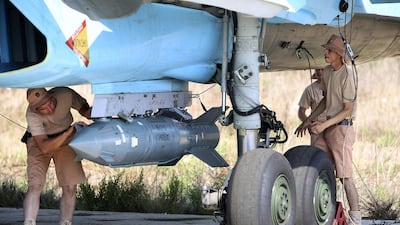Last Thursday, Russian fighter jets carried out devastating raids in the ISIL-held Syrian city of Albukamal, near the Iraqi border. At least 30 civilians were killed in the twin attacks in the city centre. Many more were seriously injured. According to activists who document atrocities, not a single ISIL member was killed in the raids.
Leaflets dropped by the regime also warned this was only the start: “The intensity of the attacks is increasing. The worst is coming. Crushing attacks will be directed to this area.”
The leaflets suggest the raids were not intended to attack ISIL specifically but were part of a systematic campaign against the local population. Also, even before the current intensity of the air strikes increases in Deir Ezzor, the government still kills more than three times the number of those killed by ISIL. According to DeirEzzor24, an organisation whose members inside the province risk their lives to document ISIL’s daily atrocities, 77 people were killed by the regime last month, compared with 25 civilians killed by the terrorist group.
The level of devastation committed by the regime in ISIL-held areas often goes unnoticed. No condemnation was issued from the US-led coalition of the massacre of civilians, which reinforces the feeling often expressed by locals that the regime, Russia and the international coalition seem to be taking turns in attacking residential areas, especially as ISIL has adjusted to the air attacks and evacuated its bases.
If the international coalition believes that ISIL does not command the support of the local population living under it, as officials often claim, then silence over such atrocities cannot be justified. Locals living under ISIL are the international coalition’s safety net against the group and its attempts to ensconce itself in areas under its control, especially in border areas where locals still view it with suspicion.
Silence over such atrocities and failure to distance the anti-ISIL coalition from them only bolsters the group’s claims that there is a global war on those communities. The attacks in those areas, in particular, have no apparent tactical purpose other than to punish the local population.
The Russian planes would have served a military purpose if they had attacked ISIL’s advanced troops that surround and besiege the regime’s strongholds near the city of Deir Ezzor.
For people living under ISIL, the absence of condemnation inevitably makes the devastation caused by Russian or Syrian planes seem part of the overall international offensive, rather than as a continuation of the regime’s military campaign. The international coalition does not have the luxury of remaining quiet about such atrocities while hoping that locals would make a distinction based on the sounds of the different jets above their heads.
As I have written in these pages before, the US-led coalition has already caused suffering for the local population through the targeting of their livelihoods – either by destroying bridges or resources – without disrupting ISIL’s ability to profit. On the contrary, many poor families have allowed their children to join the group to generate income. Since then, similar reports emerged out of ISIL-controlled Iraqi and Syrian areas, such as Mosul and Palmyra, that the poor are drawn closer to ISIL because they were deprived of income as a result of the air strikes.
The arrival of the Russian planes, with their ability to cause more damage, has added to the profound daily suffering of civilians. The intensity of the attacks by different players creates the perfect environment for ISIL to neutralise the population and link communities on the two sides of the border as the victims of one uninterrupted campaign in Iraq and Syria. There is little doubt that locals suffer from the two foreign-led coalitions much more than they suffer under ISIL. How does the anti-ISIL coalition expect that locals will view it as a liberator when its action or inaction is contributing to their daily suffering?
Outsiders normally find it hard to have moral outrage towards atrocities committed in ISIL-controlled territory either because they cannot imagine a worse reality than that of living under the terrorist group or because they suspect civilians are complacent by staying there. But this attitude is dangerous, especially if the cause of that suffering is countries that want to draw a wedge between ISIL and locals as the way to uproot the organisation.
There is also a tendency to think that as locals suffer more as a result of ISIL’s control of their areas, they will somehow reject it. That might be true in some cases, but not when no legitimate and viable alternatives exist and when supposed liberators are conspicuously complicit in the suffering. The current campaign against ISIL lacks many essential ingredients for success – a moral compass should not be one of them.
Hassan Hassan is associate fellow at Chatham House’s Middle East and South Africa Programme, a non-resident fellow at the Tahrir Institute for Middle East Policy and co-author of ISIS: Inside the Army of Terror
On Twitter: @hxhassan

